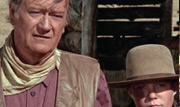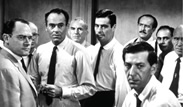
What's your favorite film? Is there a movie that changed your life? Send us an essay of 500 words, give or take, about that film you can't forget – classic or contemporary – and we'll consider it for publication in these pages. In addition to your short essay, send your name, occupation, hometown, phone number, jpeg headshot and e-mail address to Editor@AFI.com. We reserve the right to edit for length and clarity.
READER REVIEW: YOU HAD ME AT ROM-COM
By Diane Blumenthal

Diane Blumenthal is an executive assistant from Silver Spring, Maryland.
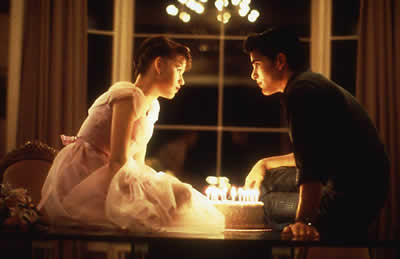 Sean Thornton and Jake Ryan. These two movie characters changed my life. Are you familiar with them? John Wayne played Thornton in THE QUIET MAN (1952). If you haven't seen this movie, you should, like right now. But I digress. Wayne plays a retired boxer who returns to his family homeland of Ireland where he finds acceptance, friendship and his soul mate in the lively Mary Kate Danaher played by Maureen O'Hara. Thornton is a guy's guy – tough, but sensitive and a gentleman. Women feel safe with him and men want to hang out with him. There are kissing scenes in this movie that have never been duplicated, and shouldn't be. My love of rom-coms started with this movie and this character.
Sean Thornton and Jake Ryan. These two movie characters changed my life. Are you familiar with them? John Wayne played Thornton in THE QUIET MAN (1952). If you haven't seen this movie, you should, like right now. But I digress. Wayne plays a retired boxer who returns to his family homeland of Ireland where he finds acceptance, friendship and his soul mate in the lively Mary Kate Danaher played by Maureen O'Hara. Thornton is a guy's guy – tough, but sensitive and a gentleman. Women feel safe with him and men want to hang out with him. There are kissing scenes in this movie that have never been duplicated, and shouldn't be. My love of rom-coms started with this movie and this character.
My love continued with Jake Ryan. Have you heard of a little movie called SIXTEEN CANDLES (1984)? I grew up in the '80s, so I was steeped in teenage hormone hell when I saw this movie and it made a big impact. Michael Schoeffling is in the Teen Movie Hall of Fame for playing Ryan. He's the definition of dreamy! And the fact that he's getting tired of his popular girlfriend and is intrigued by Molly Ringwald's wallflower, Samantha Baker, only makes him more attractive. This movie is so relatable. After Samantha is told that Jake asked about her, she starts going over scenarios in her head of how to get a conversation started. Who hasn't done that? Then, of course, when faced with her crush, she just squeaks and runs away. The movie dances with them trying to connect and then, at Sam's sister's wedding, outside the church, as cars are leaving, Sam looks up and Jake (with his red Porsche) is just there. Well that scene is perfection. Of course, the last scene with them sitting on a table and smooching over her birthday cake is pretty good, too. But this movie makes girls everywhere think the most popular guy in school could notice them. Is it realistic? Heck, no. But is it fun? Hell, yes.
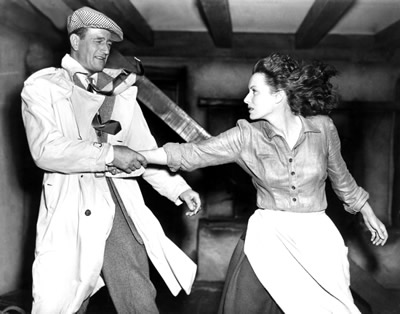 Those two films were just the beginning. Rom-coms have had a hold on me ever since. Some of my favorite ones are A ROOM WITH A VIEW (1985) – young lovers, set in Europe, and an all-male skinny-dipping scene – what more do you need?; SOME KIND OF WONDERFUL (1987) – Eric Stoltz' and Mary Stuart Masterson's “practice kiss” in the garage – whoa!; WHILE YOU WERE SLEEPING (1995) – I love “Lucy” played by Sandra Bullock; NEVER BEEN KISSED (1999) – best scene in a ballpark ever; SHE'S ALL THAT (1999) – once again, popular guy, plain girl (it's my Achilles' heel); TWO WEEKS NOTICE (2002) – Sandra Bullock's rigid lawyer and Hugh Grant's laissez-faire boss were a great match; FEVER PITCH (2005) – you don't need to be a baseball fan to love this movie; and THE UGLY TRUTH (2009) – hello, Gerard Butler! And don't even get me started on Jane Austen; she's in a category all her own.
Those two films were just the beginning. Rom-coms have had a hold on me ever since. Some of my favorite ones are A ROOM WITH A VIEW (1985) – young lovers, set in Europe, and an all-male skinny-dipping scene – what more do you need?; SOME KIND OF WONDERFUL (1987) – Eric Stoltz' and Mary Stuart Masterson's “practice kiss” in the garage – whoa!; WHILE YOU WERE SLEEPING (1995) – I love “Lucy” played by Sandra Bullock; NEVER BEEN KISSED (1999) – best scene in a ballpark ever; SHE'S ALL THAT (1999) – once again, popular guy, plain girl (it's my Achilles' heel); TWO WEEKS NOTICE (2002) – Sandra Bullock's rigid lawyer and Hugh Grant's laissez-faire boss were a great match; FEVER PITCH (2005) – you don't need to be a baseball fan to love this movie; and THE UGLY TRUTH (2009) – hello, Gerard Butler! And don't even get me started on Jane Austen; she's in a category all her own.
Now, I'll admit, maybe my love of rom-coms has caused me to think of various "meet-cute" scenarios (how a future romantic couple meets, usually in an adorable way), but it's worth it. I love these movies because they make you think that anything is possible. Then again, maybe I could follow Cher's advice from MOONSTRUCK (1987) and just "snap out of it."
READER REVIEW: AMADEUS
By Andrea Passafiume

Andrea Passafiume is the Associate Programmer of AFI Docs in Silver Spring, Maryland.
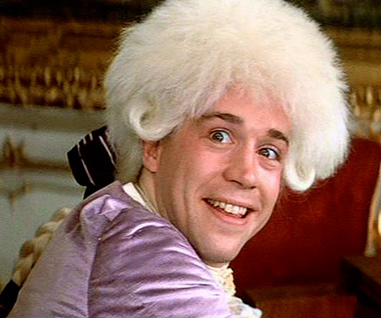 What makes one person a vessel for genius and another for mediocrity? Why are gifts sometimes bestowed upon the undeserving? Why are some granted the ability to recognize greatness, but not possess it themselves? These are some of the questions at the heart of Milos Forman's spectacular Oscar®-winning 1984 film AMADEUS, which tells the (highly fictionalized) story of famed composer Wolfgang Amadeus Mozart and his rival, fellow composer Antonio Salieri.
What makes one person a vessel for genius and another for mediocrity? Why are gifts sometimes bestowed upon the undeserving? Why are some granted the ability to recognize greatness, but not possess it themselves? These are some of the questions at the heart of Milos Forman's spectacular Oscar®-winning 1984 film AMADEUS, which tells the (highly fictionalized) story of famed composer Wolfgang Amadeus Mozart and his rival, fellow composer Antonio Salieri.
Based on Peter Shaffer's hit 1979 stage play, AMADEUS brilliantly avoids falling into any of the stuffy costume drama potholes by deftly balancing cheeky humor with heavy tragedy. It is a bold narrative strategy that becomes less about Mozart (played with twinkling petulance by Tom Hulce), and more about his clandestine enemy, Salieri (F. Murray Abraham in an Oscar®-winning performance). While Mozart is unquestionably the film's driving force, AMADEUS is Salieri's story.
F. Murray Abrahams' nuanced performance as the bitter Salieri is riveting and seamless. He is a complex character driven by frustration, rage, self-loathing and blinding jealousy at being merely adequate in the face of true genius. Salieri is ensconced in a quiet self-declared war against not only Mozart, but also himself and God. Abraham brings raw intensity to the dark, tormented character, making him eminently human. Despite his underhanded maneuvering, we still feel compassion for this frustrated artist who must live the agony of feeling passed over by God in favor of a vulgar, pompous, insolent man-child.
Nowhere are Salieri's conflicts better demonstrated than in the wonderful scene in which Salieri has proudly composed a welcome march for Mozart who is visiting the court of Emperor Joseph II (played with amiable dimness by Jeffrey Jones). In the scene, the Emperor fumbles his way through a plodding rendition of the music Salieri has slaved over to impress Mozart. Salieri is then swiftly humiliated by his grinning rival who, in a matter of seconds, performs a spontaneous improvisational upgrade on the piece, effortlessly transporting the tune to another level. Genius, for Mozart, is a mere afterthought.
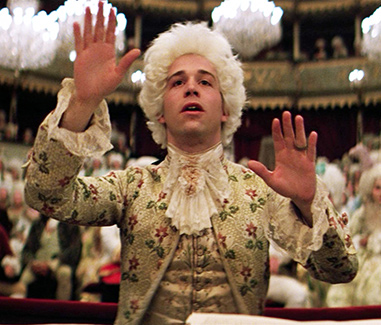 Filled with Mozart's glorious music, sumptuous locations and exquisite scenes from period operas, AMADEUS is a study in contrasts. The film is at once grand and accessible, hilarious and tragic right through to its conclusion when the underappreciated Mozart meets his unceremonious end in a pauper's grave. Ultimately, it is Salieri who earns greater sympathy, for most of us identify not with genius, but rather with the adequate. “I speak for all mediocrities in the world,” says Salieri at the end of the film. “I am their champion. I am their patron saint.”
Filled with Mozart's glorious music, sumptuous locations and exquisite scenes from period operas, AMADEUS is a study in contrasts. The film is at once grand and accessible, hilarious and tragic right through to its conclusion when the underappreciated Mozart meets his unceremonious end in a pauper's grave. Ultimately, it is Salieri who earns greater sympathy, for most of us identify not with genius, but rather with the adequate. “I speak for all mediocrities in the world,” says Salieri at the end of the film. “I am their champion. I am their patron saint.”
The first time I had the opportunity to see AMADEUS I turned it down. It was playing at the Tara Cinemas in Atlanta, Georgia in 1984 when I was visiting my older brother at Emory University. I was a budding cinefile, but at 14 years old, costume dramas were still a tough sell.
It was about a year later when I finally had the wisdom to sit down and watch this epic tale, and it was a transcendent cinematic experience. It was the first time I realized that historical costume drama didn't have to be synonymous with boring or dry and that complex internal conflict could play out before my eyes in a riveting story that held my attention from beginning to end. AMADEUS is a film of which I never tire and the one that first reminded me to always put aside any pre-conceived notions and remain open to all forms of great storytelling.
Edit Here
|
Edit Here |



